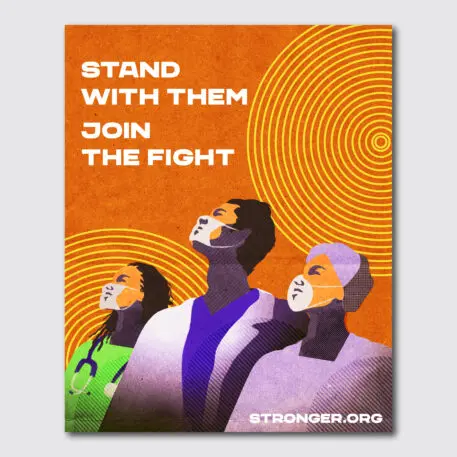The vast majority of Americans think that vaccines are a good idea—but the small (but growing) anti-vax movement is far more vocal. A new advocacy campaign is designed to mobilize the majority to speak out to help fight misinformation, at a time when the end of the current pandemic will hinge in part on the public’s willingness to be vaccinated.
Public health officials haven’t always understood how much damage anti-vax groups could do, says Joe Smyser, CEO of Public Good Projects, the nonprofit leading the new campaign. “It was easy to dismiss it—if you were in public health—as a kind of fringe group that may be very active online, but the tangible, real-world impacts were limited,” he says. “I think that was the perception in my field for a very long time, until a couple of years ago.”
As groups have become more organized—with private Facebook groups in every state, national Facebook groups, and national leaders active on other social media—they began running organized attacks. If a state is considering a bill requiring childhood immunizations, for example, “you have floods of anti-vaxxers now swarm states when these bills pop up,” he says. “You’ll get tens of thousands of comments across all different social media platforms.” Anti-vaxxers from other states, and even other countries, get involved, often personally attacking lawmakers who support the bill. Public health departments don’t have the resources, or the training, to respond.

In the middle of the current pandemic, that could have serious consequences: Assuming a COVID-19 vaccine is ready next year, it will need to be widely disseminated. It’s possible that 60% of the population, or more, will need to be vaccinated to reach herd immunity. “If you have protests every time you try to do this—and you have this very strategic erosion of trust in public health and government at the same time you’re trying to reach that 60% number—that might be a recipe for disaster,” he says. Anti-vax sentiment has also led to the resurgence of other diseases, like measles.

The nonprofit doesn’t expect to necessarily convert anti-vaxxers. But they want to stem the growth of the movement. “We are concerned about people who people in public health would classify as vaccine-hesitant. So they’re on the fence, and they are vulnerable to misinformation,” says Smyser. “I do personally hope that if someone were an anti-vaxxer, their mind could be changed. But I don’t view that as being in our lane. I view our lane as, let’s empower the 84% who do believe in the evidence base, and if they all are doing and saying things, then hopefully, we’ll stop the erosion of trust. And if people who are hesitant are going to fall one way or the other, they’ll fall on the side of the majority, not succumb to the anti-vaxxers.”
Recognize your brand’s excellence by applying to this year’s Brands That Matter Awards before the early-rate deadline, May 3.
